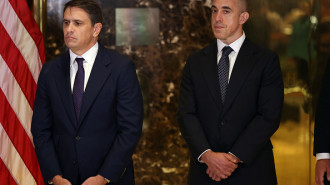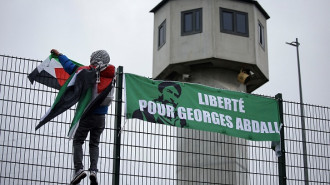South Yemenis demand independence vote at UN peace talks
Waving the flag of former south Yemen - featuring a bright blue triangle with a red star - some 30 southerners called for freedom under the watchful eye of Swedish police.
South Yemen was an independent country until the 1990 unification under president Ali Abdullah Saleh, a northerner who ruled for more than three decades and was killed by his rebel allies in 2017.
The south has long complained of neglect and marginalisation - grievances which did not disappear under current President Abedrabbo Mansour Hadi, who is himself a southerner and has led the country during the devastating war.
Multiple protesters told AFP they were seeking a referendum on southern independence and shouted "Free, free South Arabia" with a loudspeaker.
"We are here to demand our right, as original inhabitants, just like in Scotland, for a referendum," Abedelfattah Haddad, who hails from the southern city of Daleh, told AFP.
"If the UN talks of democracy and pluralism, why not hold a referendum?"
Nearly four years into a war that has pushed 14 million Yemenis to the brink of starvation, the Saudi-backed government of Abedrabbo Mansour Hadi and Houthi rebels, linked to Riyadh's arch-rival Iran, have been in UN-brokered talks since Thursday in the rural town of Rimbo in Sweden.
Southerners had complained of under-representation in the run-up to the Sweden talks. The government and rebel delegations include one southerner each, allied with the respective party.
"We are the children of the south," Hend Omairan, a southern Yemeni activist, told AFP.
"We are here today to send a message to the government and the UN special envoy: why is the south not represented in this conversation, in these consultations?"
In October, UN envoy Martin Griffiths met with the head of Yemen's southern separatist movement, following the group's calls for a "peaceful uprising" against President Abd Rabbo Mansour Hadi.
Aidarous al-Zoubeidi and Griffiths met in Abu Dhabi to discuss "the UN envoy's efforts to revive [peace] talks and the participation of the Southern Transitional Council in future negotiations", his STC movement said in a statement.
The Aden-based STC has accused Hadi's government of negligence and corruption.
The STC, which calls for the reinstatement of an independent south Yemen, has gained traction in its push for self-rule over the past year.
Allied with army troops trained by the UAE, the separatists in January seized control of parts of Aden province.
More than 10,000 people have been killed since a Saudi-led coalition launched a military campaign to help the internationally recognised government regain control of territory lost to the Houthi rebels. Yemen's multi-faceted conflict has pushed the impoverished country to the brink of famine, triggering what the United Nations says is the world's worst humanitarian crisis.
The UAE, which has over the years garnered substantial influence over the south of the country, has been widely accused of war crimes.
In August, a report obtained by Al Jazeera revealed Abu Dhabi was operating a network of 27 clandestine prisons in southern Yemen, where inmates are subject to torture and brutal interrogation techniques.
The report described instances of physical and psychological torture as well as scenes of Emirati army personnel and their Yemeni allies committing sexual abuse. Detainees were raped and given electric shocks to the chest, armpits and genitals, it said, noting more than 49 were killed as a result of the torture.
In July, the UN Human Rights Office also confirmed that Yemeni detainees had been tortured and sexually abused by Emirati soldiers.
Yemeni security officials said local forces backed by the UAE were expanding their reach in the country's south, where they have clashed with forces loyal to the internationally recognised president.
Yemeni minister Saleh al-Jabwani accused the UAE of trying to fragment the country by creating separate "regional and tribal armies" in the south.
Follow us on Twitter: @The_NewArab







 Follow the Middle East's top stories in English at The New Arab on Google News
Follow the Middle East's top stories in English at The New Arab on Google News


![Aid Gaza [Getty]](/sites/default/files/styles/image_330x185/public/2010004231.jpeg?h=cb957c44&itok=NpHeiZFt)